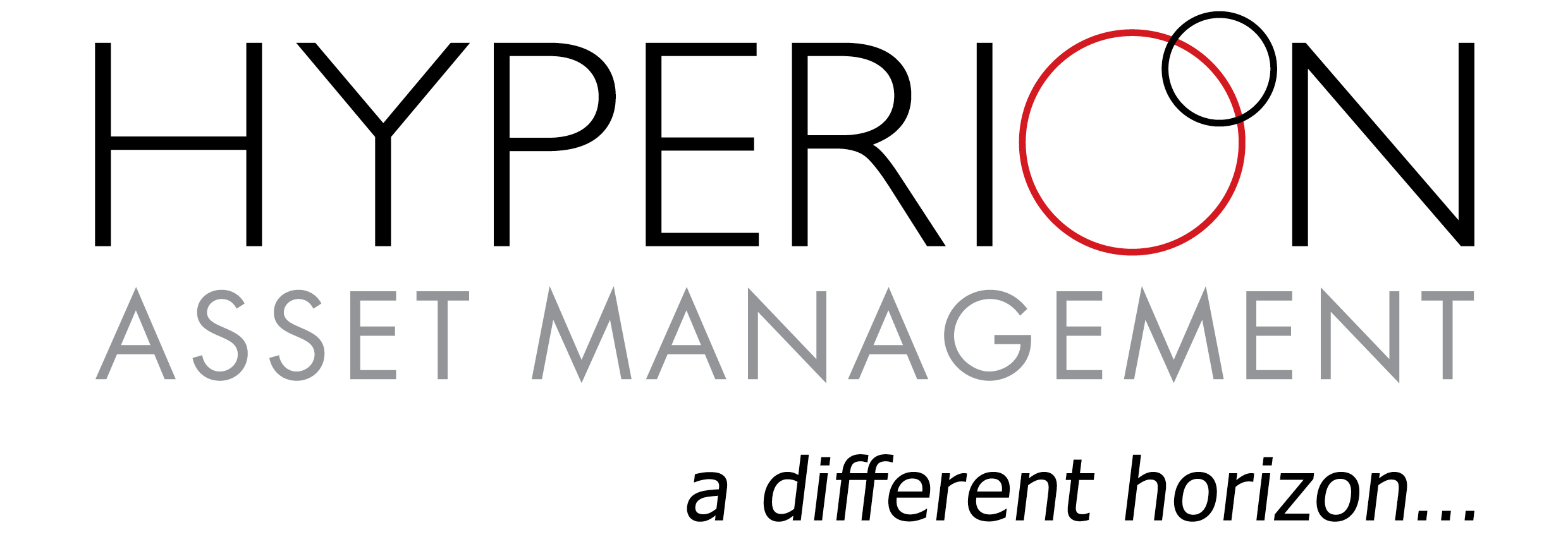HYPERION ASSET MANAGEMENT - MAY 2021
How Hyperion aims to protect and grow your investment

By Mark Arnold (Hyperion CIO) and Jason Orthman (Hyperion Deputy CIO)
Economic outlook and portfolio construction
When economic conditions are favourable most businesses can do well and in the short-term, portfolios containing average and low-quality firms may well have strong performance. However, over the longer-term there are both upturns and downturns in economic cycles, sometimes for prolonged periods of time and in the longer-run, returns of portfolios containing average and low-quality businesses suffer. Prior to the GFC, many below average businesses steadily grew their earnings, often assisted by financial leverage. The earnings and the associated share price appreciation produced in these buoyant economic conditions were illusionary and not sustainable in more modest economic conditions.
Hyperion aims to maintain a portfolio of stocks that are robust and resilient, even in downturns and difficult economic environments. The investment processes of Hyperion are designed to weed out average and low-quality businesses allowing the investment team to focus their research efforts on only high-quality businesses that are positioned to sustain and grow even in harsh economic climates. For example, Hyperion’s portfolios have been stress tested and significantly outperformed through difficult economic conditions such as the GFC, European debt crisis and the COVID-19 crisis.
In the period since the GFC, economic conditions have been subdued. The global economy is currently recovering from the COVID-19 crisis, global growth rates have been strong partly because of many countries adoption of aggressive monetary and fiscal policy, which has inflated asset prices and helped reduced unemployment from the high levels experienced during 2020. More importantly however, the long-term macro-economic outlook is for continued low levels of economic growth globally. Compared with the strong economic conditions that the global economy enjoyed in the six decades between the end of WW2 and the GFC, the long-term growth outlook is modest at best. We believe the world is likely to continue to experience low inflation, low growth, and low interest rate conditions for decades to come.
The key structural headwinds impeding the economic growth outlook include ageing populations, high consumer and government debt levels, rising levels of inequality in most countries, the increasingly disruptive impacts of climate change, artificial intelligence (AI), and robotics. Under these low growth economic conditions, it will be difficult for average businesses to thrive or even survive; whereas high quality businesses are the last to be affected by difficult economic conditions and are ultimately positioned to take market share. Businesses with structural tailwinds, innovative cultures that can adapt to and drive change, and sustainable capital structures (i.e., strong balance sheets) have a significant advantage over average and low-quality businesses. 2
What characteristics do high quality businesses have that gives them an advantage even in economic downturns?
Four key characteristics that Hyperion seeks when identifying high quality businesses are:
- Proven structural growth (tailwinds);
- Innovative cultures;
- Low debt levels; and
- Sustainability.
Proven structural growth (tailwinds)
Businesses that have structural growth tailwinds, include those businesses that can grow by utilising disruptive technologies that are the cause of fundamental change in industries. Lower quality businesses tend to be those that are enmeshed in old technology, are unable to recognise and/or respond to disruption and are beholden to economic cycles. These businesses are either unwilling to accept change or not in a position to transfer to the disruptive technology quickly or efficiently. As such, these companies lose market share. This is an outcome that is likely to be detrimental to longer-term survival and a problem that increases in magnitude in a low growth economy.
Hyperion looks for firms that have created products with strong value propositions that have the potential to expand addressable markets and take revenues away from traditional competitors. Examples of portfolio firms that have successfully disrupted industries and have structural growth tailwinds are Amazon in the retail sector, Alphabet in media and advertising, and PayPal in the payments sector.
Innovative Culture
In order to position a business to recognise and benefit from disruption and structural change it needs to have an organisational culture that embraces innovation. Hyperion views high quality firms as having a culture of innovation. This culture needs to be observed through the whole of the business from top management down. Examples of attributes associated with an innovative culture would be: (i) senior management’s understanding and insight regarding the influences of change on their product and market; (ii) appropriate investment in research and development; and (iii) creation of environments structured to encourage an innovative workforce (e.g., Google’s campuses built to facilitate “smart creatives”). These are just some of the characteristics the Hyperion investment team seeks when identifying high quality businesses. Furthermore, senior management needs to be able to convert this culture into a successful commercial reality.
A strong balance sheet
The Hyperion investment team view high quality firms as having low debt levels. The reason for this is that shareholders in firms that have low debt levels are less likely to experience binomial outcomes during difficult economic times. Having low debt levels affords businesses the ability to make decisions without the threat of liquidation if the business goes through periods of adverse change or low growth.
Sustainability
Sustainability has been core to Hyperion’s investment philosophy and process since it was established in 1996. Hyperion has a long-term investment horizon of 10 years or greater, and we have always invested as business owners, not short-term share traders. This is evidenced by the fact that historically our average stock holding period for our portfolios is approximately 10 years. We only invest our clients’ capital in those businesses that we believe are extremely high-quality with strong and sustainable value propositions to all stakeholders. The stakeholders include the wider community and an assessment of the company’s future likely long-term impact on the overall natural environment, including its carbon footprint. Sustainability assists in reducing the risks of any permanent 3
loss of capital across our holdings. Eventually, companies that externalise costs, will be forced by external stakeholders to internalise them – either through regulation or changing expectations of society. As such, long-term sustainability is a core component of our philosophy.
We believe our portfolios contain very low ESG risk due to this long-term focus and the substantial qualitative and quantitative research completed on all our holdings. Short-term share traders do not care about the long-term fundamentals and sustainability of the businesses they trade in, as their sole focus is on short-term share price performance (alpha generation) during their (brief) holding period. These alpha traders do not need to worry about the long-term sustainability of the business because they are merely short-term “renters” of the stock.
Conclusion
These are four key attributes the investment team at Hyperion considers when researching companies. By investing only in the highest quality businesses, we aim to protect and grow our clients’ capital sustainably over the long term.
Disclaimer:
Hyperion Asset Management Limited (‘Hyperion’) ABN 80 080 135 897, AFSL 238 380 is the investment manager of the Funds. Please read the Product Disclosure Statement (‘PDS’) in its entirety before making an investment decision in the Funds. You can obtain a copy of the latest PDS of the Funds by contacting Hyperion at 1300 497 374 or via email to investorservices@hyperion.com.au.
The fund changed its name from Hyperion Global Growth Companies Fund – Class B to Hyperion Global Growth Companies Fund (Managed Fund) on 5 February 2021 in order to facilitate quotation of the fund on the ASX.
Hyperion and Pinnacle Fund Services Limited believes the information contained in this communication is reliable, however no warranty is given as to its accuracy and persons relying on this information do so at their own risk.
Any opinions or forecasts reflect the judgment and assumptions of Hyperion and its representatives on the basis of information at the date of publication and may later change without notice. The information is not intended as a securities recommendation or statement of opinion intended to influence a person or persons in making a decision in relation to investment. This communication is for general information only. It has been prepared without taking account of any person’s objectives, financial situation or needs. Any person relying on this information should obtain professional advice before doing so. To the extent permitted by law, Hyperion disclaim all liability to any person relying on the information in respect of any loss or damage (including consequential loss or damage) however caused, which may be suffered or arise directly or indirectly in respect of such information contained in this communication.
Subscribe to our updates
Stay up to date with the latest news and insights from Pinnacle and our Affiliates.

